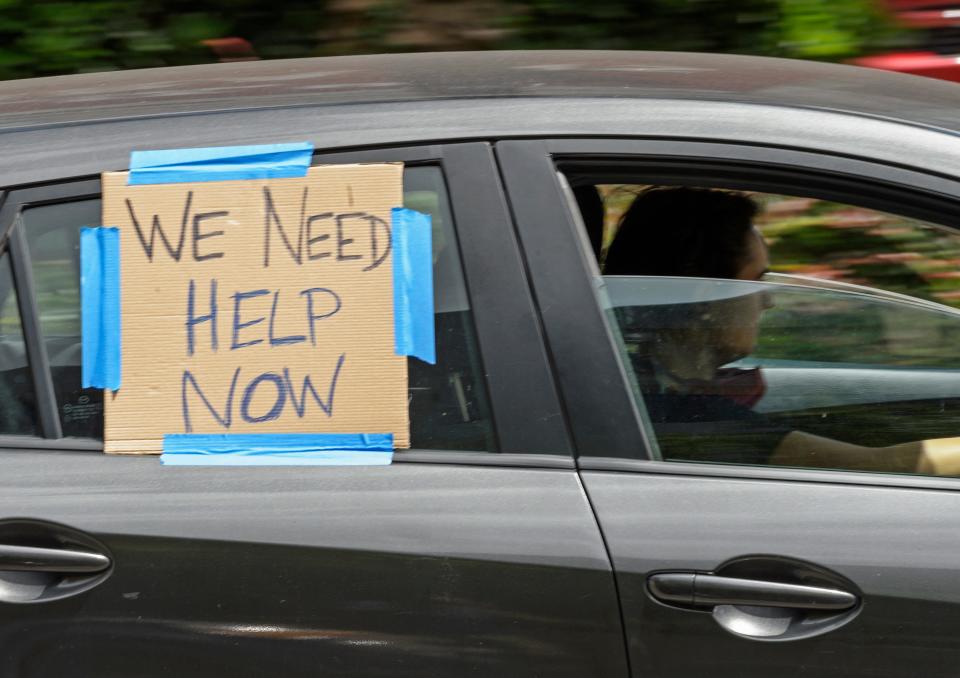Coronavirus doesn't take a vacation, neither should Congress on relief for the unemployed
For the estimated 30 million out-of-work Americans struggling to make ends meet during a virus-fueled economic collapse, Friday will mark four weeks of living on little more than a few hundred dollars a week in state unemployment compensation. That average income of $370 per week falls shamefully short of what the jobless need to survive, and it's why Congress and President Donald Trump agreed in March to add $600 a week in federal benefits.
But the federal supplement ended in late July, and Americans — millions of whom lost their health coverage along with their jobs — have started making hard choices on spending for food, rent or medical bills. "It’s just about life or death in some situations," said Melissa Rusk, an unemployed resident of Bradenton, Florida.
And how did Congress respond to this dire situation? It left town. Without a deal. In the middle of a health and economic crisis.
Unemployment remains 10%
Lawmakers don't even have the excuse that they have to attend the national political conventions, which are primarily virtual in this year of COVID-19. They need to get back to work now and come together on an agreement for desperately needed relief.
Not only would this keep countless families financially afloat, but it also remains one of the best ways to stimulate an economy stricken when states ordered businesses to shut down in March as the virus rapidly spread.

The partial recovery that began after many of those states quickly reopened has already begun to stall, with the epidemic untamed and an unemployment rate of 10% that continues to rival the Great Recession.
If there is any good news, it is that there are signs of movement after weeks of stalemate between House Democratic leaders and the White House.
Ways to compromise
The House has been called back into session to pass separate funding for the U.S. Postal Service, and Speaker Nancy Pelosi signaled Tuesday that Democrats are open to compromise on a broader relief package that would include supplemental unemployment payments.
Pulling new post office money out of the larger relief debate is a smart move. The Postal Service has enough cash on hand to operate into next year, and additional funding for it was one sticking point for Republicans on the coronavirus relief. (The larger concern for now has been whether the new postmaster general, a Trump ally, was purposely slowing down mail delivery, potentially delaying mail-in balloting.)
One of the toughest areas of impasse remains the amount of any unemployment supplement. Trump tried to fill the void with an executive action directing a $300 a week federal payment, to be matched by $100 from the states. But the federal money might only last a few weeks, many states say they can't afford the $100, and clunky state computer systems make the whole plan unwieldy to implement.
Far better to address the situation through legislation. The parties aren't that far apart that this can't be resolved: Many Republicans want to cut the federal supplement to $400, while Democrats demand keeping the additional $600. Republicans argue that the money, in some cases, is more than recipients were earning and can be a disincentive to returning to work.
A compromise might already exist within the House Democratic caucus, where three members have suggested that the $600 could be ratcheted down over time depending on the jobless rate in individual states.
The other key area of disagreement on the relief package was bailout funding for state and local governments strapped by coronavirus-driven budget shortfalls. Trump has argued that this would simply be largesse for poorly run blue states. That's nonsense. Plenty of Republican-dominated states — Alaska, Idaho and West Virginia, to name a few — face similar budgetary crises.
Even so, the Democratic demand for $915 billion is arguably too high. Several nonpartisan analysts have projected state budget shortfalls falling somewhere between $200 billion and $800 billion, plenty of room for Congress to make a deal.
And, in good faith, the Democrats should also agree to the Republican demand to protect businesses that follow public-health guidelines from COVID-related liability lawsuits.
For lawmakers another week off in August, for vacation or campaigning or fundraising, is just another week. But for jobless Americans, every day of political posturing is another day of staring into the financial abyss.
USA TODAY's editorial opinions are decided by its Editorial Board, separate from the news staff. Most editorials are coupled with an opposing view — a unique USA TODAY feature.
To read more editorials, go to the Opinion front page or sign up for the daily Opinion email newsletter. To respond to this editorial, submit a comment to letters@usatoday.com.
This article originally appeared on USA TODAY: Coronavirus unemployment relief: Congress needs to get back to work

